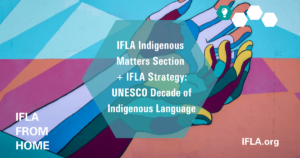Units + Strategy: IFLA Indigenous Matters Section and the UNESCO Decade of Indigenous Languages
02 March 2022
 Aligned to the IFLA Strategy’s Key Initiative 1.4, the IFLA Indigenous Matters Section will actively support the UNESCO Decade of Indigenous Languages with projects and events, emphasising the role of libraries in advancing the rights of indigenous peoples to language.
Aligned to the IFLA Strategy’s Key Initiative 1.4, the IFLA Indigenous Matters Section will actively support the UNESCO Decade of Indigenous Languages with projects and events, emphasising the role of libraries in advancing the rights of indigenous peoples to language.
Language is vital to the well-being, cultural practices, and living heritage of Indigenous peoples. However, many Indigenous languages throughout the world are endangered through lack of use or threatened by limits to freedom of expression. The UNESCO Decade of Indigenous Languages (2022-2032) is intended to support and advance the Rights of Indigenous peoples to language, and respond to an urgent need to language protection and revitalization.
The UNESCO Decade of Indigenous Languages supports UNDRIP (UN Declaration on the Rights of Indigenous People) and its calls for the recognition of the rights of Indigenous people to Self-Determination and specifically recognizes that: “Indigenous peoples have the right to revitalize, use, develop and transmit to future generations their histories, languages, oral traditions, philosophies, writing systems and literatures, and to designate and retain their own names for communities, places and persons.” The strategic recommendations for the Decade of Indigenous Languages include such tenets as freedom of expression, access to education in the mother tongue, and right to public life in native languages. The UNESCO Decade of Indigenous Languages presents a key opportunity to leverage IFLA’s relationship with UNESCO, advance Indigenous rights, and highlight the important intersections between libraries and access to knowledge, education, culture, and language.
The Indigenous Matters Section (IFLA IM) is highly committed to promoting and protecting Indigenous languages, and proposes a three-year project that will focus on building strategic goals that holistically connect the activities of the Section in relation to Indigenous languages to all of IFLA, as well as Indigenous library and cultural organizations, and to other groups, in a holistic fashion. We feel this is a vital activity that is pertinent to all IFLA Units and IFLA itself. Many members of the Unit are already Indigenous language advocates and see language as highly integrated with the work of the Unit and the IFLA as a whole.
In addition to this project, the Indigenous Matters Section, also has the following projects planned for the 2021-2023 term:
- A set of guidelines for library services with Indigenous peoples needed to ensure Indigenous peoples are not subject to exploitation, marginalised, or disadvantaged within their homeland with regards to library facilities, services, policies, and practices.
- A role as editors on a special issue of the “Serials Librarian” journal on the intersection of Indigenous Matters and issues relevant to the Journal.
- Teachings: LIS & Indigenous Librarianship, an activity that creates spaces for MLIS educators and others to discuss curriculum for Indigenous librarianship with the goal of informing MLIS, Masters of Information, and other professional development programs.
- Strengthening relationships with International Indigenous Librarians’ Forum (IILF) and other international and regional associations and professional bodies. Promote ourselves and communicate what we are doing and strengthen connections with ALA, AILA, IILF, NIKLA and others. IFLA IM has a longstanding relationship with IILF by presenting at conferences, leading workshops, participating in guidelines discussions.
The Section also plans a series of membership engagement and connection opportunities. Visit the Indigenous Matters project page, follow them on twitter, Facebook, and YouTube, and sign up for their forthcoming newsletter to stay apprised of their work.